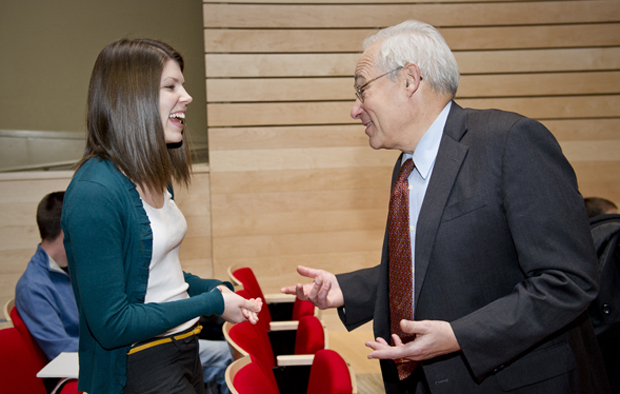At the edge of a cliff, health care must evolve quickly

Dr. Donald Berwick (right), the country’s former Medicare and Medicaid administrator, speaks with Northeastern University student Kayla DeVincentis prior to his lecture Tuesday, part of the Healthcare Improvement Leadership Seminar Series. Photo by Mary Knox Merrill.
To reverse America’s unsustainable health-care costs, Congress must adopt more refined, nimble strategies and get tough in the face of those pushing to keep the status quo, according to Dr. Donald M. Berwick, a leader in the fight to improve medical care and wellness in the United States.
“Policymakers are dealing with health care with very thick mittens on, so we need new leaders with new ideas, skills and voices,” Berwick said on Tuesday at the quarterly Healthcare Improvement Leadership Seminar Series held in Blackman Auditorium. The event was sponsored by Northeastern’s Healthcare Systems Engineering Program.
Berwick, the country’s former Medicare and Medicaid administrator, said that when Congress does act, it often does so at the expense of the nation’s poorest and most vulnerable.
“It is inevitable, in my view, that the safety net for the poor will be under siege,” he said. “The poor don’t vote and they don’t have lobbyists, so they don’t have a say in this.”
To prevent changes that hurt rather than improve health care in America, students and professionals in the fields of health care and systems engineering need to speak out and offer new, bold and innovative solutions, he said.
“All I can say is that your voices help. In Washington, the squeaky wheels get the grease — and we need a lot of new wheels.”
Berwick’s lecture, delivered to a wide audience of students and professionals in health and engineering fields from across the Boston area, stressed the need for broad changes in health care to improve six areas of the health-care field: safety, effectiveness, patient-centeredness, timeliness, efficiency and equity. President Obama’s signature health-care law, the Affordable Care Act, helps to accomplish those goals, he said, by creating new tools to provide better care in those areas.
“We’re at a very historic time in the progress of health care in our nation,” Berwick said. “We’re on the path at last — and last among Western democracies — of making health care a human right.”
James Benneyan, a professor of industrial engineering and director of the Healthcare Systems Engineering Program, said Berwick was a powerful speaker about the ability of the local medical community — among the nation’s top regions for health care — to take on a national set of issues.
“This isn’t an engineering program, it’s not a public health problem, it’s not a nursing problem,” Benneyan said. “This is all of our problem, and we’ve got to work together to create broad solutions.”
The Healthcare Systems Engineering Program works to have a broad impact on the nation’s health-care system through research, education and application of engineering improvement sciences.




